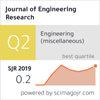An integrated SWARA-QFD under Fermatean fuzzy set approach to assess proactive risk mitigation strategies in recycling supply chain: Case study of plastic recycling industry
IF 0.9
4区 工程技术
Q3 ENGINEERING, MULTIDISCIPLINARY
引用次数: 0
Abstract
The role of the recycling supply chain in managing plastic waste problems has been emphasized by both academics and practitioners. Plastic recycling producers face various risks associated with supply chain processes that require proper management and proactive strategies to mitigate negative impacts on business performance. However, quantitative research on risk factors and corresponding proactive risk mitigation strategies in recycling supply chain has been limited. This study proposes a novel integrated approach using Stepwise Weight Assessment Ratio Analysis (SWARA) and Quality Function Deployment (QFD) under the Fermatean fuzzy set framework to fill this research gap. The study identifies eleven risk factors of recycling supply chain and eight corresponding proactive risk mitigation strategies through literature review and expert validation. The SWARA technique is employed to compute the relative importance weights of risk factors, and QFD is used to analyze the relationship between risk factors and corresponding proactive risk mitigation strategies. The proposed framework is applied to a recycling plastic packaging waste manufacturer in Thailand as a case study. The results demonstrate that the proposed framework can assist logistics and supply chain managers in the recycling plastic industry in making rational decisions to implement proactive risk mitigation strategies. Moreover, the framework can be applied to other waste recycling industries in a similar way.
在 Fermatean 模糊集方法下的综合 SWARA-QFD 评估回收供应链中的主动风险缓解战略:塑料回收行业案例研究
学术界和实践者都强调了回收供应链在管理塑料废物问题中的作用。塑料回收生产商面临着与供应链过程相关的各种风险,需要适当的管理和积极主动的战略来减轻对业务绩效的负面影响。然而,对回收供应链中的风险因素及相应的主动风险缓解策略的定量研究还很有限。本文提出了一种基于Fermatean模糊集框架的逐步权重评价比分析(SWARA)和质量功能展开(QFD)的集成方法来填补这一研究空白。通过文献回顾和专家验证,本研究确定了回收供应链的11个风险因素和8个相应的主动风险缓解策略。采用SWARA技术计算风险因素的相对重要性权重,采用QFD分析风险因素与相应的主动风险缓解策略之间的关系。提出的框架应用于泰国的塑料包装废物回收制造商作为案例研究。结果表明,所提出的框架可以帮助回收塑料行业的物流和供应链管理者做出理性决策,实施主动的风险缓解策略。此外,该框架可以类似方式应用于其他废物回收行业。
本文章由计算机程序翻译,如有差异,请以英文原文为准。
求助全文
约1分钟内获得全文
求助全文
来源期刊

Journal of Engineering Research
ENGINEERING, MULTIDISCIPLINARY-
CiteScore
1.60
自引率
10.00%
发文量
181
审稿时长
20 weeks
期刊介绍:
Journal of Engineering Research (JER) is a international, peer reviewed journal which publishes full length original research papers, reviews, case studies related to all areas of Engineering such as: Civil, Mechanical, Industrial, Electrical, Computer, Chemical, Petroleum, Aerospace, Architectural, Biomedical, Coastal, Environmental, Marine & Ocean, Metallurgical & Materials, software, Surveying, Systems and Manufacturing Engineering. In particular, JER focuses on innovative approaches and methods that contribute to solving the environmental and manufacturing problems, which exist primarily in the Arabian Gulf region and the Middle East countries. Kuwait University used to publish the Journal "Kuwait Journal of Science and Engineering" (ISSN: 1024-8684), which included Science and Engineering articles since 1974. In 2011 the decision was taken to split KJSE into two independent Journals - "Journal of Engineering Research "(JER) and "Kuwait Journal of Science" (KJS).
 求助内容:
求助内容: 应助结果提醒方式:
应助结果提醒方式:


